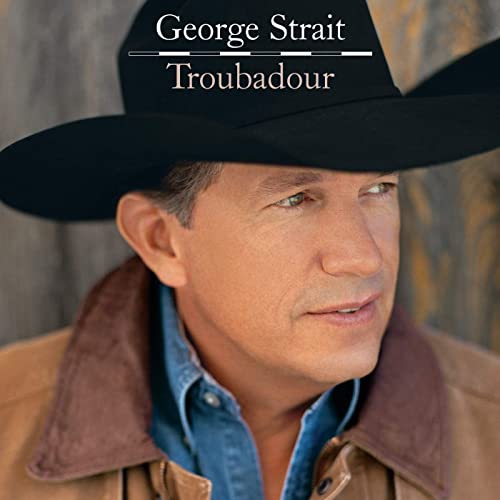My previous columns, I believe, have made the point that my preferences in country music rest in the “classic” era — or almost anything recorded prior to about 1993. Still, one artist transcends time: George Strait.
From the first time I spun “Strait Country” on my turntable as a 15-year-old in 1981, I was hooked on the music of the artist who would one day be known as “King George” to millions. As much as I hated to fall in step with the crowd, it would have been impossible to part ways with George Strait and his 60 No. 1 singles. After all, I considered myself a George Strait “original.” I didn’t jump on the bandwagon midway through a career that saw him rack up more chart-topping songs than Elvis, the Beatles, and Strait’s closest competitor, Conway Twitty.
Strait covered a lot of territory before recording a pure truck-driving song, but it finally came on his 2008 CD, “Troubadour.” Solo performers and groups normally only release three or four songs as singles out of the 10 or 12 recorded on a CD. Over the years, Strait has recorded dozens of “would be” chart-toppers that never received radio airplay. “Brothers of the Highway” is just one, and in the opinion of a few truck drivers who have emailed me about the song, it might be his best.
The beauty of “Brothers of the Highway” is not so much in the way Strait presents the song; rather it is the way co-writers — including the late Kim Williams, Nichole Witt and Doug Johnson — composed the lyrics. The trio of writers skillfully connected the golden age of truck-driving songs — often considered a sort of musical mythology — with the reality of the important role truck drivers play in keeping the nation’s economy moving. In fact, in choosing Strait to record the song, the writers made a masterful selection. While remaining true to his musical roots, Strait has a proven record of successfully crossing boundaries throughout his career, one now entering its fifth decade.
“Brothers of the Highway” offers listeners a choice when categorizing it in a country-music sub-genre. In two minutes and 43 seconds, Strait sings a love song, a road song, a truck-driving song and a ballad — one of pirates and heroes.
The title, “Brothers of the Highway,” prepares the listener for what lies ahead. It begins as a love song, as Strait sings of a driver once again saying good-bye to his wife who, like other wives Strait describes in countless songs of rodeo and life as a musician, knows she can’t hold him back from his calling to the highway.
Next, as the driver pulls onto the road, Strait gives a nod to the 1960s and ’70s, when truck-driving songs built up drivers as modern-day cowboys. When Burt Reynolds solidified the image of a truck driver as a cowboy, outlaw and hero in the movie “Smokey and the Bandit,” he successfully tied generations of truck drivers together in a brotherhood reminiscent of pirates in early America. For all their flaws, pirates have carried a historical flair, leaving a taste of adventure in the mouths of the many children and adults who dream of the days when, as leaders of the brotherhood, captains like Johnny Depp guided ships.
Strait wastes no time connecting the beloved outlaws of days gone by to modern-day truckers through metaphors comparing those brotherhoods of buccaneers and the ships they sailed to the modern brotherhood of drivers and their terrestrial “ships” that carry cargo to all corners of the country. Both pirates and truck drivers head for the sunset, the trucks sailing on the freedom of the open road. Still, just as the listener’s mind drifts to childhood dreams of playing pirates with a fallen tree or even a cardboard box as a ship, Strait abruptly returns to reality. After all, unlike pirates who didn’t follow itineraries, truck drivers don’t have the same freedom. The highways and roads don’t allow for the same type of travel as the open seas.
In listing destinations and routes truckers might drive coast to coast (“Carolina west to Denver, Baton Rouge east to Pittsburg, Portland south to San Diego — sail on, sail on”), Strait does offer the illusion of free, open roads, albeit with a sense of urgency pirates seldom felt. After all, “truck-stop coffee, goes running through his veins” keeps the driver moving toward a destination a pirate only reached in a drunken state with an empty barrel of rum by his side.
Finally, Strait concludes with a line proving, if the listener has yet to catch on, that “Brothers of the Highway” is a different type of trucking song. Rather than contributing to the outlaw image of truckers — dodging scales, tearing up “swindle sheets” or taking “little white pills” to keep their eyes open wide — “Brothers of the Highway” is a tribute to truck drivers and the miles they travel in service to America.
In the 12 years since George Strait recorded “Brothers of the Highway,” the song has been covered by the bluegrass group Dailey & Vincent and more recently by a real-life truck driver, Tony Justice, joined by former driver-turned-musician Aaron Tippen. When the song wraps up with the line, “God bless you, brothers of the highway, children of the wind,” the meaning of the tune is clear. With it, Strait added a truck-driving song to his discography and, as he so often does with all topics of which he sings, he offered truck drivers the praises of a king.
Since retiring from a career as an outdoor recreation professional from the State of Arkansas, Kris Rutherford has worked as a freelance writer and, with his wife, owns and publishes a small Northeast Texas newspaper, The Roxton Progress. Kris has worked as a ghostwriter and editor and has authored seven books of his own. He became interested in the trucking industry as a child in the 1970s when his family traveled the interstates twice a year between their home in Maine and their native Texas. He has been a classic country music enthusiast since the age of nine when he developed a special interest in trucking songs.








